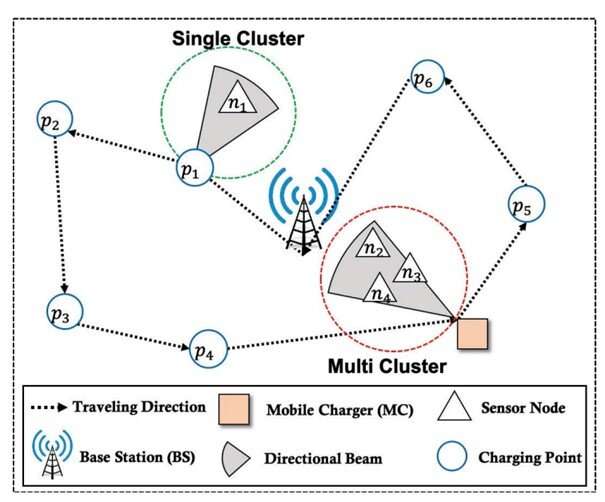
Smart factories, vehicles, and cities increasingly use wireless rechargeable sensor networks (WRSNs) for communication. A distinct advantage of WRSNs is that they can be placed in remote, inaccessible, or even biologically or chemically contaminated areas for communication, surveillance, and reconnaissance in military and environmental applications. However, the potential of these WRSNs is restricted by their reliance on limited energy sources like batteries, which can impede their smooth functioning.
The primary challenge of WRSNs is to effectively charge and maintain the batteries of the sensors in the network. The charging efficiency plummets as the charging distance increases. Therefore, single charging is more energy-efficient than multicharging as it can charge a sensor node at a closer range. However, when multiple nodes are present, multicharging may achieve higher efficiency.
This motivated a team of researchers led by Professor Sungrae Cho, from the School of Computer Science and Engineering, Chung-Ang University, to optimize mobile charging of sensors efficiently through wireless power transmission technology. As Prof. Cho states, “The wireless power transmission using a mobile charger was designed to be an efficient method, but if a directional antenna was not used, this method was power inefficient. Therefore, I started researching to see if there is an efficient way to use it.”
In a recent article published in IEEE Internet of Things Journal, the researchers developed an energy-efficient adaptive directional charging (EEADC) algorithm that considers the density of sensor nodes to adaptively choose single charging or multicharging. As EEADC dynamically determines the charging strategy based on the charging efficiency, the researchers achieved equal or better charging efficiency than single charging and simultaneously reduced energy waste due to overuse of multicharging.
EEADC employs a mean-shift algorithm considering node density to determine single charging/multicharging clusters that is more efficient than the standard K-Means algorithms employed in most Monte Carlo (MC) clustering methods. Each cluster is classified as a single-charging or multicharging cluster according to the number of sensor nodes it contains. The charging strategy, which includes the charging point, beam direction, charging power, and charging time, is then determined according to the type of cluster.
For a multicharging cluster, the non-convex optimization problem having multiple feasible regions led the researchers to employ the discretized charging strategy decision (DCSD) algorithm to solve the problem efficiently. The DCSD divides the problem into two subproblems. The candidate charging points are obtained by solving the first subproblem. Then, DCSD selects the point with the lowest energy consumption among the candidate charging points as the optimal charging point.
The researchers used simulations to compare EEADC to conventional charging methods in practice. The team demonstrated that EEADC outperformed the existing methods with respect to power consumption and charging delay by 10% and 9%, respectively.
In summary, the adaptive and directional features of EEADC significantly enhance the energy efficiency of charging sensors in WRSNs. As Prof. Cho explains, “Using this algorithm, the charging efficiency can be significantly increased by using a directional antenna and a directional beam for charging the sensor node, and sensors located close to each other can be efficiently charged at the same time.”
Industrial sites such as smart factories, large ships, and construction sites will greatly benefit once this algorithm is employed. Effective and efficient monitoring of diverse sites through a wireless sensor network could be seamlessly achieved through this technology. The energy-efficient mobile charging of the sensors could significantly reduce the maintenance cost of WRSNs.
Donghyun Lee et al, Energy-Efficient Directional Charging Strategy for Wireless Rechargeable Sensor Networks, IEEE Internet of Things Journal (2022). DOI: 10.1109/JIOT.2022.3163400
Provided by
Chung Ang University
Citation:
Researchers develop adaptive directional charging for efficient wireless rechargeable sensor networks (2022, November 15)
retrieved 16 November 2022
from https://techxplore.com/news/2022-11-efficient-wireless-rechargeable-sensor-networks.html
This document is subject to copyright. Apart from any fair dealing for the purpose of private study or research, no
part may be reproduced without the written permission. The content is provided for information purposes only.
Stay connected with us on social media platform for instant update click here to join our Twitter, & Facebook
We are now on Telegram. Click here to join our channel (@TechiUpdate) and stay updated with the latest Technology headlines.
For all the latest Technology News Click Here
For the latest news and updates, follow us on Google News.
